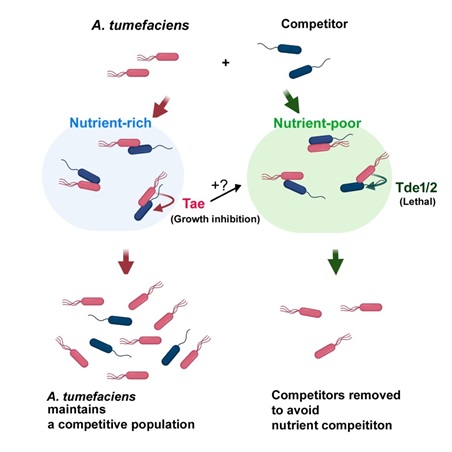[Erh-Min Lai] Agrobacterium tumefaciens Deploys a Versatile Antibacterial Strategy to Increase its Competitiveness
POST:Research Fellow Erh-Min Lai and her team at IPMB have discovered a versatile antibacterial strategy in plant pathogen Agrobacterium tumefaciens for interbacterial competition. Type VI secretion system (T6SS) is a miniature weapon in gram-negative bacteria that deploys multiple effectors to kill or suppress growth of target recipient cells. However, little is known about the biological significance of harboring such a repertoire of effectors. The team reported that the T6SS antibacterial activity of A. tumefaciens can be enhanced under carbon starvation or when recipient cell-wall peptidoglycan is disturbed. This led to a newly discovered role for the T6SS peptidoglycan amidase Tae effector in providing a growth advantage dependent on the growth status of the target cell. This is in contrast to the Tde DNase effectors that are dominant during carbon starvation. The study suggests that combining Tae and other effectors could allow A. tumefaciens to increase its competitiveness among changing environmental conditions.
The work is published online in Journal of Bacteriology and selected as a spotlight for publication in 1st February issue of 2021. The 1st author Manda Yu is a former postdoc in the Lai lab and currently an Assistant Scientist at Department of Biological Sciences, University of Wisconsin, Milwahkee. Other authors contributed to this work include the lab manager Yi-Chieh Wang, and two former postdocs Ching-Jou Huang, Lay-Sun Ma who is currently an Assistant Research Fellow at IPMB.
Yu M, Wang YC, Huang CJ, Ma LS, and Lai EM*. (2020) Agrobacterium tumefaciens Deploys a Versatile Antibacterial Strategy to Increase its Competitiveness. J Bacteriol. 2020 Nov 9:JB.00490-20. doi: 10.1128/JB.00490-20.
